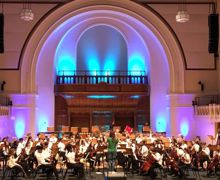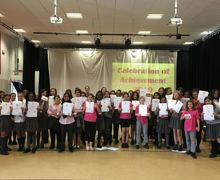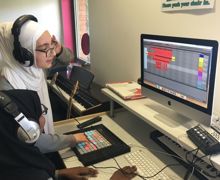Music
The arts and sport are crucial in developing and enriching the lives of our students. No matter their starting point, we aim to nurture talents and interest, broaden artistic experiences and fulfil their cultural entitlement.
Overview
The Music Department believes that ‘Music is for Everyone’. Our courses have been uniquely designed to develop students’ musical skill set to foster a love of music and the arts. The students will explore a breadth of musical genres to develop their cultural capital allowing for a wider appreciation of the world around them. Music is a thriving and vibrant part of the culture of Elizabeth Garrett Anderson School. We offer many exciting opportunities to showcase our students’ achievements through performances and collaborations with professionals from across the music industry. We aim to challenge and inspire all of our students through a variety of extracurricular activities, including:
Junior Choir
Senior Choir
Chamber Orchestra
Band Practice
Keyboard Club
Open rehearsals
An enthusiastic and dedicated team of peripatetic staff offer instrumental lessons to all of our GCSE students and to pupils who choose to learn an instrument in years 7, 8 and 9. We currently offer Voice, Piano, Trumpet, Flute, Clarinet, Saxophone, Bassoon, Cello, Drum Kit, Guitar and Bass Guitar. Students are given the opportunity to complete ABRSM grades alongside our classroom curriculum.
Curriculum Content
Music Curriculum Map
Ways for parents to support learning
Music at Key Stage 3
All students in KS3 study music as part of the curriculum. The music lessons focus on the 3 main areas of composing, performing and listening and are taught in specialist rooms, each with access to a full range of musical equipment. Each of our rehearsal spaces are kitted out with a full band setup, and students also benefit from access to our music media suite complete with a range of digital learning tools.
We are a partner school with Music in Secondary Schools Trust, the Sir Andrew Lloyd Webber programme (MiSST). Sitting within our curriculum, all students will learn to play an orchestral instrument and learn classical music theory, enhancing their solo and ensemble musical skills.
In year 7:
- Introduction to Musical Elements
- Introduction to Solo performance skills - Keyboard and Drums
- Introduction to Ensemble performance skills -
- Beginner Composition
- Bhangra
- Choral singing
- MiSST
In year 8:
- Developing Musical Elements
- Composition - Film Music
- Solo skills - Guitar and Bass,
- Ensemble skills - Band Music
- The Blues
- Jazz
- MiSST
In year 9:
- Unheard Analysis - Musical Theatre
- Composition - minimalism
- Mastering Solo and Ensemble skills
- Music Tech and Song Writing
- Careers in the Music Industry
Independent Study Resources for KS3
https://www.mydso.com/dso-kids/learn-and-listen/instruments
https://learningmusic.ableton.com/
Music at Key Stage 4
The Eduqas GCSE Music course is split into 3 main areas which build on the prior knowledge of performing, composing and listening developed at KS3. This course is weighted into 60% practical application of musical skills and 40% theoretical knowledge.
The students will compose two pieces of music (30%). They will work with an excellent team of peripatetic staff on their performance skills to rehearse and record in our specialist recording studio, one solo and one ensemble performance (30%). They will sit a listening & appraising exam at the end of the course (40%).
The listening & appraising content will cover four main areas of study:
- AOS 1 - Musical Forms and Devices. By listening to and analysing music from the Western Classical Tradition (Baroque, Classical and Romantic eras) students will learn about musical structures e.g. binary form, ternary form, rondo form and develop understanding of how composers use different devices to develop music.
- AOS 2 - Music for Ensemble. Through the study of Jazz and Blues, Musical Theatre and Chamber Music students will learn about how music is composed for small groups, about textural contrasts and instrumentation.
- AOS 3 - Film Music. Students will explore how music for film is created, developed and performed.
- AOS 4 - Popular Music. Exploring Rock and Pop, Bhangra and Fusion music. Students will also develop understanding of music technology and effects.
Independent Study Resources for KS4
https://www.teoria.com
https://www.mydso.com/dso-kids/learn-and-listen/instruments
Contact
Please contact the Head of Music, admin@egas.islington.sch.uk, if you would like more information about the course.





